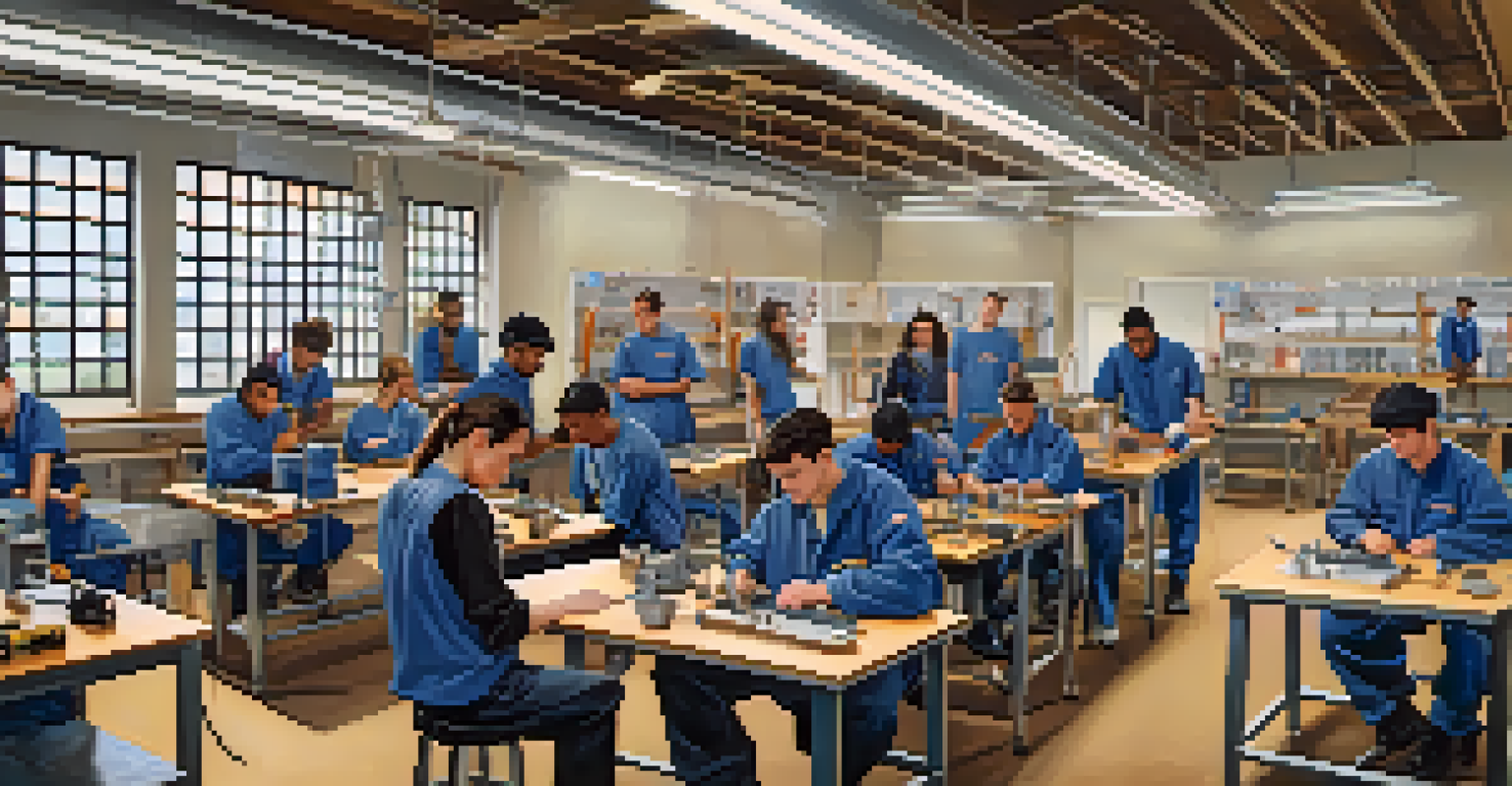The Role of Education in Strengthening Houston's Workforce

Understanding Houston's Workforce Needs and Challenges
Houston's economy is booming, but with opportunity comes challenges. As industries evolve, the demand for skilled workers increases. This creates a pressing need for education systems to align with the workforce's requirements, ensuring that graduates possess the necessary skills and knowledge.
Education is the most powerful weapon which you can use to change the world.
In sectors like healthcare, technology, and energy, employers are actively seeking employees who are job-ready. However, many graduates find themselves lacking in practical skills, making it difficult for them to transition smoothly into their roles. Addressing this gap is crucial for both individual success and overall economic growth.
By identifying the specific skills in demand, educational institutions can tailor their programs to better prepare students. This not only benefits students but also strengthens Houston's economy by providing businesses with a skilled workforce.
The Importance of STEM Education in Workforce Development
In an age where technology drives many industries, STEM (Science, Technology, Engineering, and Mathematics) education has become vital. Houston, known for its strong presence in sectors like aerospace and healthcare, needs a workforce skilled in these areas. Emphasizing STEM education will ensure that students are equipped for high-demand jobs.

For example, programs that focus on coding, data analysis, and engineering principles can lead to exciting career opportunities. By integrating hands-on learning and real-world applications into the curriculum, educators can inspire students to pursue these fields. This not only enhances individual career prospects but also supports the city's economic growth.
Aligning Education with Workforce Needs
Houston's education systems must adapt to equip graduates with the skills that align with the evolving demands of industries.
Moreover, early exposure to STEM concepts through school initiatives can cultivate interest and proficiency among students. As more young people pursue careers in STEM, Houston will be better positioned to compete on a national and global scale.
Community Colleges: Bridging the Skills Gap
Community colleges play a crucial role in addressing the skills gap in Houston's workforce. They offer affordable and accessible education options tailored to local industries. With programs designed to meet specific workforce needs, these institutions are essential for equipping students with practical skills.
The future belongs to those who prepare for it today.
For instance, many community colleges in Houston have established partnerships with local businesses to ensure their curriculum aligns with industry standards. This collaboration allows students to gain hands-on experience through internships and apprenticeships, making them more attractive to employers.
By focusing on workforce development, community colleges can help students transition from education to employment seamlessly. This not only benefits individuals but also strengthens the local economy by providing businesses with a steady supply of skilled workers.
The Role of Vocational Training in Houston
Vocational training is an essential component of workforce development in Houston. Unlike traditional educational pathways, vocational programs provide targeted training for specific careers, such as plumbing, electrical work, and culinary arts. These programs equip students with practical skills that are immediately applicable in the workforce.
As industries face a shortage of skilled labor, vocational training offers a viable solution. It allows individuals to enter the job market quickly, often in high-demand fields, while also providing a pathway to higher wages. This is particularly significant in Houston, where the cost of living continues to rise.
STEM Education is Crucial
Emphasizing STEM education will prepare students for high-demand careers, supporting both individual growth and Houston's economic development.
Furthermore, vocational training can help diversify the workforce by attracting individuals who may not pursue a four-year degree. By promoting these programs, Houston can ensure a robust, well-rounded workforce that meets the needs of various industries.
The Impact of Higher Education on Houston's Economy
Higher education institutions in Houston, such as universities and research centers, play a pivotal role in the local economy. They not only provide advanced education but also contribute to innovation and research that drives economic growth. Graduates from these institutions often fill leadership positions within local industries, further strengthening the workforce.
Moreover, universities often collaborate with businesses to conduct research and development initiatives. This synergy fosters an environment of innovation, leading to new products and services that can boost the economy. As a result, the relationship between higher education and local businesses is essential for Houston's continued prosperity.
By investing in higher education, Houston can cultivate a highly skilled workforce that is adaptable to changing industry demands. This ensures that the city remains competitive and can attract new businesses looking for a skilled labor pool.
Lifelong Learning: Adapting to a Changing Workforce
In today's fast-paced world, lifelong learning has become essential for workforce sustainability. As technology and industry standards evolve, workers need opportunities to update their skills continually. Houston's workforce must embrace a culture of lifelong learning to remain competitive in the job market.
Organizations and educational institutions can offer training programs, workshops, and online courses to facilitate this ongoing education. For example, many companies in Houston provide professional development resources to their employees, ensuring they stay current in their fields. This not only benefits the worker but also enhances the company's overall performance.
Community Colleges Bridge Skills Gap
Community colleges in Houston provide accessible training aligned with local industry needs, facilitating smooth transitions from education to employment.
Encouraging a mindset of continuous learning helps individuals adapt to shifting job requirements and fosters a resilient workforce. By prioritizing lifelong education, Houston can ensure its workforce remains agile and ready for the challenges of tomorrow.
The Future of Education and Workforce in Houston
Looking ahead, the relationship between education and Houston's workforce will continue to evolve. As new technologies emerge and industries transform, educational institutions must remain flexible and responsive to these changes. This adaptability will be crucial in preparing students for the jobs of the future.
For instance, the rise of artificial intelligence and automation is reshaping job roles across many sectors. Educational programs that incorporate these technologies will help ensure that graduates are prepared to thrive in an increasingly digital landscape. Collaboration between educators, industry leaders, and policymakers will be vital in shaping this future.

Ultimately, a strong partnership between education and the workforce will lead to a more prosperous Houston. By investing in innovative educational strategies and fostering a culture of collaboration, the city can build a workforce that's ready to tackle the challenges of tomorrow.